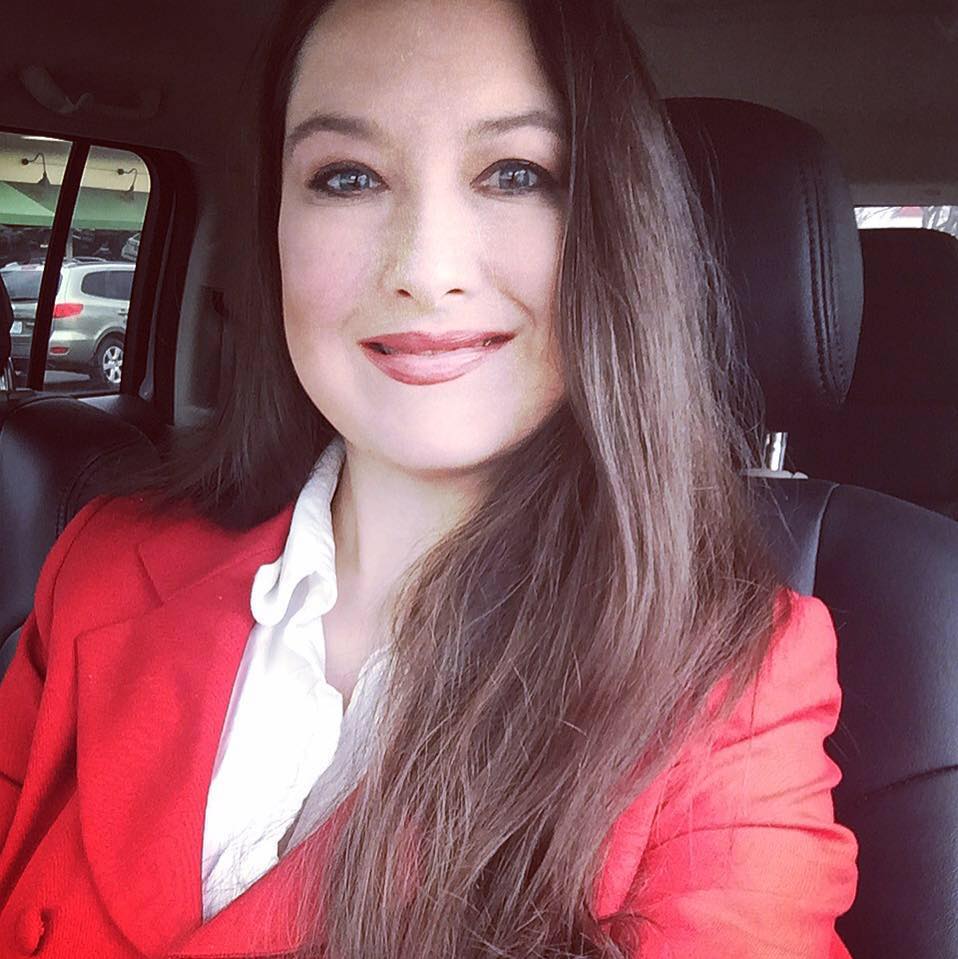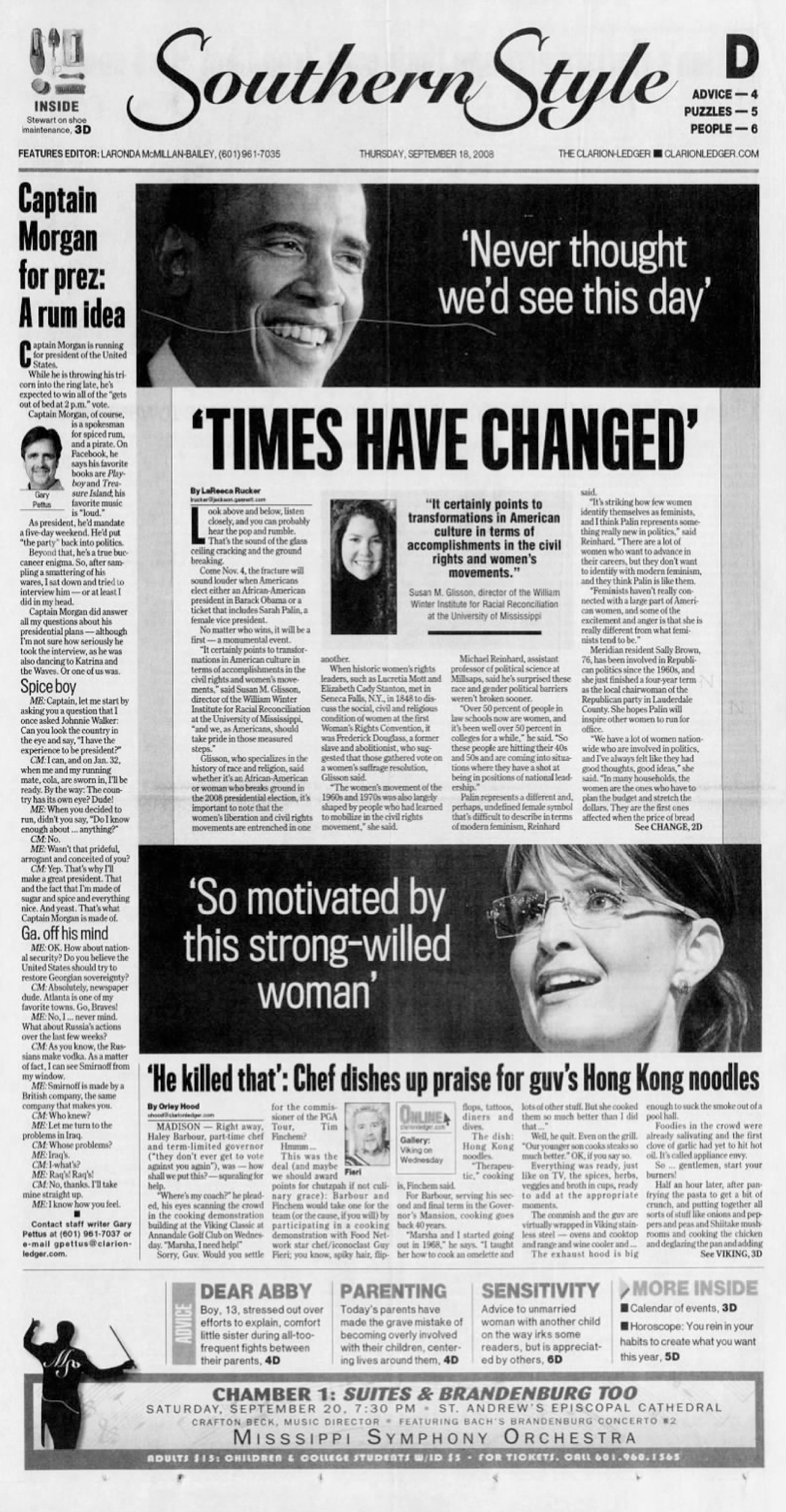'Never thought we'd see this day': Times have changed
LaReeca Rucker
The Clarion-Ledger
Look above and below, listen closely, and you can probably hear the pop and rumble. That's the sound of the glass ceiling cracking and the ground breaking.
Come Nov. 4, the fracture will sound louder when Americans elect either an African-American president in Barack Obama or a ticket that includes Sarah Palin, a female vice president. No matter who wins, it will be a first - a monumental event.
"It certainly points to transformations in American culture in terms of accomplishments in the civil rights and women's movements," said Susan M. Glisson, director of the William Winter Institute for Racial Reconciliation at the University of Mississippi, "and we, as Americans, should take pride in those measured steps."
Glisson, who specializes in the history of race and religion, said whether it's an African-American or woman who breaks ground in the 2008 presidential election, it's important to note that the women's liberation and civil rights movements are entrenched in one another.
When historic women's rights leaders, such as Lucretia Mott and Elizabeth Cady Stanton, met in Seneca Falls, N.Y., in 1848 to discuss the social, civil and religious condition of women at the first Woman's Rights Convention, it was Frederick Douglass, a former slave and abolitionist, who suggested that those gathered vote on a women's suffrage resolution, Glisson said.
"The women's movement of the 1960s and 1970s was also largely shaped by people who had learned to mobilize in the civil rights movement," she said.
Michael Reinhard, assistant professor of political science at Millsaps, said he's surprised these race and gender political barriers weren't broken sooner.
"Over 50 percent of people in law schools now are women, and it's been well over 50 percent in colleges for a while," he said. "So these people are hitting their 40s and 50s and are coming into situations where they have a shot at being in positions of national leadership."
Palin represents a different and, perhaps, undefined female symbol that's difficult to describe in terms of modern feminism, he said.
"It's striking how few women identify themselves as feminists, and I think Palin represents something really new in politics," said Reinhard. "There are a lot of women who want to advance in their careers, but they don't want to identify with modern feminism, and they think Palin is like them.
"Feminists haven't really connected with a large part of American women, and some of the excitement and anger is that she is really different from what feminists tend to be."
Meridian resident Sally Brown, 76, has been involved in Republican politics since the 1960s, and she just finished a four-year term as the local chairwoman of the Republican party in Lauderdale County. She hopes Palin will inspire other women to run for office.
"We have a lot of women nationwide who are involved in politics, and I've always felt like they had good thoughts, good ideas," she said. "In many households, the women are the ones who have to plan the budget and stretch the dollars. They are the first ones affected when the price of bread and groceries goes up, and they are the ones who help the kids with homework and know more about the school system and teachers."
Brown hopes Palin's presence will continue to challenge traditional ideas about who should get involved in politics, particularly in Mississippi.
"We still sometimes have that old mentality that women should be home baking cookies and changing diapers, and the men should be earning a living," she said. "But God didn't look to see whether we were male or female when he was giving us a brain.
"Times have certainly changed with the present generation, and with the current economy, in most households, there's no longer a choice about whether you want to go to work or not. Palin's story shows that leadership can start right at your community level or with your PTA."
Hernando resident Ellen Jernigan, 69, is another ground-breaker. She served as an alderwoman in Hernando for 12 years.
"Every woman I've talked to is just so motivated by this strong-willed woman (Palin) that we just want to get out and help her," said Jernigan, who also hopes Palin will inspire Mississippi women.
"It's still really hard to get women elected," she said. "I think there are so many bright women who are attorneys, bankers, engineers, school teachers and educators. I don't know why more women don't run for office. Maybe Sarah Palin, Hillary Clinton and the fact that they have been successful will encourage women to take part in the governmental system."
Donald Cole, a mathematics professor and assistant to the chancellor for multicultural affairs at the University of Mississippi, said this is the most exciting election the country has experienced in half a century.
"I, along with other African Americans I have talked to, never thought we'd see this day," he said. "Obama has energized African Americans, the likes of which I have not seen since the civil rights era. And I think the excitement is not just the fact that he's African American, but the message he carries - the message of hope and of reaching out. It's a world message, and all of that is exciting to us."
No matter who wins, it's historical and another stepping stone toward equality, Cole said. "Politics has just turned a corner, and we know it's going to lead to something good," he said. "I see America at its height. This election is about a lot more. The whole world is watching this particular stage, and either way, we are going to present a great show to the world."
Jackson resident Julius Adams, 68, still becomes emotional when he sees images of the civil rights era on television. The former Army soldier was stationed in Germany on the eve of America's participation in the Vietnam War in the early 1960s.
"When I came back, I found that things were different," said Adams, referring to the civil rights boycotts and sit-ins taking place. "I think it was a time for all of us to ban together to bring about change, and I think for a while there was a bit of unity and spirit, and we were really looking forward to change.
"The kids now don't know anything about being pushed aside, using different restrooms and different water fountains and not having access to things because they were black. Even the hospitals were segregated."
Adams said he hopes Obama will continue to foster the change his generation fought for.
"I think if he can do what he says he can do, the country will be in much better shape than it is now," he said. "I'm sure there will be some changes in attitudes."
Jackson resident Laken Benjamin, 20, hopes Obama will become the next president. "We have come a long way to have an African American in the White House," she said. "It will be breathtaking, exciting, something that I would have never thought could happen ever, and as people, we have to make a change right along with him. He can't do it by himself."
Jackson resident Kentrell Foster, 21, said an Obama win would mean equality.
"It will mean no matter what your race or color, if you just put effort toward your goal, you can be anything you want to be," he said.
It's bigger than Barack. It's more poignant than Palin. The election will be history-making, but Glisson said work remains on issues of race, gender and class.
"I would hope that we not only take the time to pause and celebrate, but also recommit ourselves to tearing down the remaining barriers in these areas," she said. "I hope that whoever wins, in terms of the historic nature of the victory, that all marginalized groups will take some hope in that."


